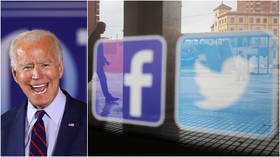‘Censorship Rubicon’? Big Tech burying Biden-Ukraine story either wakes up Republicans or drives nail in their political coffin

If Big Tech's latest censorship fiasco – the suppression of a New York Post scoop that might harm Joe Biden's presidential campaign – doesn't spur Republicans to act, they may as well quit pretending to represent their voters.
If even this isn't enough to trigger so-called conservatives to loosen Silicon Valley's death grip on America's public marketplace of ideas, nothing will. All the talk about defending free speech and fighting election interference will be exposed for the meaningless posturing that it is, much like all those years of hearing Republicans campaign on stopping illegal immigration, which they had no intention of doing.
In this case, however, the stakes are more personal for Republican politicians. This isn't only about throwing their constituents under the bus and giving lip service about political bias while taking donations from the likes of Google and Amazon. This time, the bus is about to run over them and leave tread-marks on their former careers in Washington.
Also on rt.com Twitter BLOCKS sharing links to NYPost’s Hunter Biden emails story, invoking ‘HACKED MATERIALS’ policy for first time everWhen the flow of news and information is controlled on political grounds to the extent it was on Wednesday, it can only lead to irreversible one-party dominance. And here's a hint for the likes of Representative Jim Jordan (R-Ohio): Google may give you money, but as the late George Carlin said, “It's a big club, and you ain't in it.” That one party's name will start with a “D.”
The Post article alleged that Biden's son, Hunter Biden, received an email in 2015 from an executive at Ukrainian energy firm Burisma, thanking him for arranging a meeting with then-Vice President Joe Biden. The alleged meeting with the executive, Vadym Pozharskyi, occurred about a year after Hunter Biden joined Burisma's board at a reported salary of up to $50,000 a month.
If the meeting was arranged by the younger Biden and took place as Pozharskyi said, it would belie Joe Biden's previous statements that he had never spoken to his son about his overseas business dealings.
.@andymstone "In the meantime"... Here is a little FACT CHECKING for your THIRD-PARTY FACT CHECKERS.#Facebookpic.twitter.com/f6td8SVNw4
— Gio |🇺🇸 (@Cubannator) October 14, 2020
The Biden campaign said no record of such a meeting appeared on the vice president's “official schedules,” but as Senator Josh Hawley (R-Missouri) pointed out, it didn't deny the veracity of the emails on which the article was based.
Biden campaign doesn’t deny veracity of Biden emails as reported by @nypost. But @Facebook@Twitter continue the censorship campaign https://t.co/3A2HqHokKT
— Josh Hawley (@HawleyMO) October 14, 2020
Nevertheless, Facebook rushed to curtail the story’s exposure. Company spokesman Andy Stone, who previously worked for two Democrat lawmakers and two Democrat campaign groups, announced that Facebook would reduce distribution of the article as part of a “standard process” to reduce spreading of “misinformation” and might do a fact-check of the story. He didn't say why the article was considered a misinformation threat.
While I will intentionally not link to the New York Post, I want be clear that this story is eligible to be fact checked by Facebook's third-party fact checking partners. In the meantime, we are reducing its distribution on our platform.
— Andy Stone (@andymstone) October 14, 2020
The next shoe dropped with Twitter, which blocked its users from tweeting links to the story or sending it in direct messages. Those who tried to spread the article got an error message saying the message couldn't be sent because it was identified as “potentially harmful.”
Wow. twitter going even further than FB and is no longer letting ppl tweet the NYPost story. This is what pops up if you try. https://t.co/YVlOTeF1iXpic.twitter.com/66kzYdwq21
— Alex Thompson (@AlxThomp) October 14, 2020
Conservative observers, such as Toby Young, joked that the article was “potentially harmful” only to Biden's campaign, but the damage was done. As in the case of Facebook, Twitter didn't make a case for the article being false, but the company said that in addition to concern over potential disinformation, the article was blocked “in line with our hacked materials policy” and a lack of authoritative reporting on where the source material originated.
By which they mean “potentially harmful” to Biden’s electoral prospects, presumably? https://t.co/XppAc0cFfE
— Toby Young (@toadmeister) October 14, 2020
In addition to filtering for political disinfo, Twitter says they're blocking NY Post Hunter Biden story because they block stories with stolen info. Easy enough to test. Let's see if they allow link to a story in the NY Post on secret audio tape of Trump. https://t.co/JoaR9dTKOP
— Omri Ceren (@omriceren) October 14, 2020
From Twitter spox: "In line with our Hacked Materials Policy, as well as our approach to blocking URLs, we are taking action to block any links to or images of the material in question on Twitter." https://t.co/4bbO621CXj
— Shannon Bond (@shannonpareil) October 14, 2020
The emails weren't hacked; rather, the Post said they were taken off a computer that Hunter Biden left at a repair shop in Delaware. In any case, the various policy explanations were excuses for censoring content that probably would have been gleefully allowed by social media platforms if the article had instead said Donald Trump Jr. was selling access to the White House.
And now Omri shows that Twitter is lying about another excuse they gave for censoring a media outlet that published negative information about its preferred candidate for the presidential election. Twitter is lying. Do not accept their lies. https://t.co/8pB4vUokBW
— Mollie (@MZHemingway) October 14, 2020
The Biden family have all made a lot of money when they did not have the skill sets. When real questions start being asked, Silicon Valley appears to close ranks and protect their man. Imagine if this story was about a Trump son? https://t.co/WxDKU4LvId
— Nigel Farage (@Nigel_Farage) October 14, 2020
Social-media giants are censoring the article because they favor Biden over Trump, and they figure no one will stop them. Mainstream media outlets are cheering on the decision because they, too, favor Biden and have no principles regarding free speech or good journalism. Before Twitter did the job for him, MSNBC producer Kyle Griffin warned that no one should be linking or sharing the Post article because they could discuss its flaws “without amplifying what appears to be misinformation.”
No one should link to or share that NY Post 'report'. You can discuss the obvious flaws and unanswerable questions in the report without amplifying what appears to be disinformation.
— Kyle Griffin (@kylegriffin1) October 14, 2020
Like Facebook and Twitter, Griffin didn't need to explain how he knew the article was disinformation. Nor did he show the least bit of self-awareness about the media's spreading of disinformation over the past four years. Adam Jentleson, a staffer for former Senator Harry Reid, even pretended to know that the article was not only disinformation, but also the work of a “Russian propaganda campaign.” Again, no explanation or facts needed.
If you promote the lame NY Post story, you are probably participating in a known Russian propaganda campaign. https://t.co/am6evTjdOa
— Adam Jentleson 🎈 (@AJentleson) October 14, 2020
Twitter also locked out the Post's account, as well as those of people who shared the story, among them actor James Woods and White House Press Secretary Kayleigh McEnany.
Conservative and independent commentators, such as Federalist co-founder Sean Davis and journalist Glenn Greenwald, saw the obvious importance and implications of Wednesday's censorship effort. Rarely is social media discussion as dominated by one topic as it was by the reaction to the Biden story.
The NY Post story was a minor, largely redundant report even if the docs are real.The extreme act of censorship by tech giants to suppress it, cheered on by journalists, is a major story of historic proportions. They always had this undemocratic power; today they used it.
— Glenn Greenwald (@ggreenwald) October 14, 2020
Twitter is now banning users from even linking to the New York Post story detailing Hunter Biden's use of his dad's office to get rich off of corrupt foreign oligarchs. This is brazen, blatant election interference from illegal tech monopolies trying to steal the election. pic.twitter.com/MlZgGLliae
— Sean Davis (@seanmdav) October 14, 2020
The danger is that all the talk just fades away and the debacle is chalked up as just another example of anti-conservative censorship and bias. There will likely never be a better poster child to expose Big Tech's criteria for which news gets covered up and which news gets promoted: If it reflects poorly on Democrats, it's disinformation, and if it makes Republicans (especially Trump) look bad, it's golden.
The Trump Administration had 4 years to tackle big tech because they're clearly working against Republicans and conservatives. Now they're literally suppressing stories related to the Bidens.
— Ryan James Girdusky (@RyanGirdusky) October 14, 2020
As conservative author Mike Cernovich pointed out, “the censorship Rubicon was crossed.” Unless the talk finally becomes action, there's no point in continuing the conversation.
The censorship Rubicon was crossed. Mark Zuckerberg has declared himself your master and owner. Do you accept this? https://t.co/NtGfAzZMo8
— Cernovich (@Cernovich) October 14, 2020
Think your friends would be interested? Share this story!
The statements, views and opinions expressed in this column are solely those of the author and do not necessarily represent those of RT.













